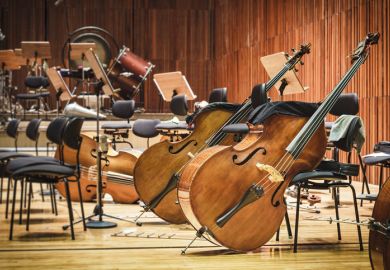Mark Kidel finds passion in an attempt to rewrite the story of music.
Bali is one of the world's most exotic tourist destinations. Package tourists descend on the island, lured by the promise of "ethnic" treasure. As the late Peter Fletcher stresses in this ambitious study of "world music", Bali is one place where traditional music, closely associated with daily religious ritual, dance and theatre, still thrives. But most trippers are only dimly aware of Bali's unique culture, and their journey is instead a brief excursion into a kind of parallel universe only a jet flight's lag away from the modern megalopolis and indistinguishable from other exotic destinations. In the shops of Ubud, Bali's major tourist trap, there are as many West African djembes and didgeridoos for sale as local instruments, and mass-produced sculptures of African deities sit alongside their Asian counterparts.
Although Fletcher does not go into this curious but revealing aspect of Bali's contemporary multi-culture, his wide-ranging study is consciously set in the context of a world in which frontiers have been blurred and the reign of commodity and commerce is supreme and global in scope. Despite the book's marketable title - which is somewhat misleading as Fletcher does not trade in the contemporary currency of world music - this is not a consumer's compendium of the musical styles from many parts of the world à la Rough or other guides. Fletcher includes the "world music" fashion and increasing fusion of different styles in his study, but his book attempts something more serious, which encompasses "classical" as well as every possible kind of "folk", popular or crossover genre, and provides a text that should prove useful to generations of students seeking a wide-ranging look at the field, as well as to a more general readership.
Using a primarily historical and geographical approach, Fletcher has attempted to present the musics of the world in a light that does not privilege Europe and the West. He acknowledges that, at the present time, western influence is predominant, as well as destructive of diversity and tradition. It is indeed interesting to note how far we have travelled in a few decades: the Larousse New Encyclopaedia of Music (first published in 1965) inevitably places European musical history at the centre, almost as if it provided the gold standard of human musical expression. The musics of other cultures get just over 20 pages to the 550 devoted almost exclusively to the European tradition. In Fletcher's book, Europe is firmly put in its place, alongside other great civilisations, much in the way that writers such as Felipe Fernandez-Armesto have done in their more general studies of world history.
Although such a revision of world cultural history is necessary, Fletcher is almost excessive in his European's zeal for self-blame, certainly in the context of a survey that attempts objectivity. The story of colonialism and white racism needs to be constantly remembered, but this is not a reason to cover in only a few sentences, for instance, early Mughal attempts at destroying Hindu culture in northern India. This last is an historical event that continues to have major repercussions, some of them positive: great mystical poetry came from the combination of Sufism and ancient Vedic thought, and the Hindustani classical music tradition owes much to Islamic influences. Europe's conquests have not had exclusively negative musical effects: jazz, as the African musician Manu Dibango once eloquently told me, "is the flower that grew out of a pile of manure - the product of the enslavement of African peoples, one of the darkest moments in human history".
Preceded by an illuminating essay written by Laurence Picken, which attempts to place music in a biological context, Fletcher's text starts with a brief but useful look at the elemental features of music as a "primary mode of expression": vocalisation, pitch, rhythm, timbre, as well as musical instruments. This is followed by an attempt to describe what Fletcher sees as fundamental changes in musical practice as agrarian societies were superseded by urban "civilisation". Fletcher sees this, from an almost romantic perspective, as an irreversible caesura, with music's "intrinsic" connection to the realm of the spiritual lost through the institutionalisation of religion: "The primal concordat between life, religion and art had been lost. Music gradually evolved from natural ritual to human artifice." What exactly is meant by "natural" as opposed to "human artifice" is, of course, open to conjecture. Such confusion is inevitable in a book that attempts so general a history of one of humanity's most essential activities.
The scope, though, is impressive: each major culture is set in historical and geographical context, and there is therefore embedded in this book a brief, if at times inevitably questionable, survey of world history. Fletcher then gives an account, drawn from the work of a multitude of specialists, of the most important musical styles of each historical, cultural and geographical period, paying close attention to cross-cultural influences. He provides as illuminating, clear and well-written introduction as any to the musics of the Indian subcontinent, South and East Asia, China and Latin America, among others. Sometimes, he relies on the solid work of those who have written for the New Grove. At other times he depends too much on secondhand sources such as Philip Sweeney's journalistic Directory of World Music (1991) or on the contested theories of Martin Bernal, whose Black Athena (1987) blazed the trail for the revision of a certain kind of cultural history.
Fletcher's description of sub-Saharan music draws too heavily (but perhaps unavoidably) on the masterly work of John Miller Chernoff, African Rhythm, African Sensibility (1979), a classic of engaged ethnomusicology that has probably done more to make African music truly accessible to western academics and audiences than any other - but which is based on the study of percussion in Ghana and little else. Fletcher hardly touches on the world of the jalis in Manding culture: a tradition that reaches back to the 13th century, and that provides essential clues to the world of African-American music today. "Call-and-response" may, as Fletcher and others have said, be one of the essential elements of African musical aesthetics, but what about the polyphony of the Baka people of Cameroon and Central Africa, and many others who have devised ways of musical interaction that equal in sophistication anything that Europe has produced?
Many other details seem ill judged. To ascribe so crucial a role in the creation of the blues to W. C. Handy is to ascribe too much importance to music publishing and commercialisation and to overlook country blues artists such as Charley Patton, Robert Johnson and Blind Willie Johnson, who do not even get a mention in the book but who have, arguably, in the long run exercised a much greater influence on 20th-century music than Handy.
Similarly, Fletcher tilts heavily at some obviously personal bêtes noires , the minimalists John Adams and Philip Glass. He may be right about their failings, but it is a pity that he should not mention, for instance, Bart"k's string quartets, significant works whose influence remains immensely strong.
Such omissions are inevitable in a work that seeks to cover so much. The book's major strength (as well as weakness) may lie in its bold attempt to cast European music in a new role, not as the pinnacle of musical achievement, but as a determining element, and as a reflection of uniquely European cultural developments. The notation of music gave rise to composition and "the silent art of the composer, became an entity in itself, separate from the act of performance". With this, as Fletcher notes, there developed "a new concept of musical 'genius' as a product of exceptional and radical individuality" in contrast with the more communal aspects of music in earlier times and in non-European cultures. Technological developments - from printing through to recording and amplification - made a crucial impact on European music-making, and through this the music-making of other cultures. It is as if Europe had maximised, in Fletcher's view, the original split between music as a natural ritual and a product of human artifice, not least through the increasing commodification of music and its role as entertainment.
The business of avoiding Eurocentricity is, of course, in part self-defeating: in avoiding a traditionally "progress-biased" view of history, well-meaning authors such as Fletcher are still limited by that which they oppose and are stuck in a predominantly historical perspective - even if hierarchies are turned upside down and values are fashionably relativised. However much he tries to find a new historical-geographical paradigm, avoiding at every opportunity the pitfalls of ethnocentrism, Fletcher's adoption of a global perspective is panoptic and therefore characteristically European.
As he surely knew when writing the book, and suggests at various times, the strength of non-European music has derived in large part from a continuing connection with place and with identity. There are "horizontal" or spatial connections expressed and strengthened through shared beliefs, rituals and relationships, a more-or-less flexible structure that facilitates and sustains community. Simultaneously, the thread of tradition, harking back through time to the realm of the ancestors, provides a community with rootedness, an ability to draw on the wisdom and experience of earlier generations. It is these connections that provide a safe and appropriate space for the excesses, boundary-breaking, emotional highs and transcendence that have characterised the most powerful music in every culture: supporting structures whose absence in contemporary westernised societies is reflected in excessive and self-destructive use of drugs as well as in a dearth of music that genuinely touches the deepest parts of the human soul.
It is perhaps unfair to expect of Fletcher's courageous efforts at rewriting the history of music that he should address more than a few issues of contemporary importance. It is indeed enough that he should have attempted a serious reassessment of the way in which we tell ourselves the story of music. The author cares for ancient traditions threatened by fusion, commercialism and a widespread sense of cultural inferiority in relation to the West. He is also concerned with the fashionable contemporary reluctance to classify musical performances or achievements in terms of value. There is evidence of real passion in the book - contained by a desire for breadth of coverage and structural consistency.
The book's unconventional narrative is undoubtedly stimulating, but something of music's essence is lost in the wide-ranging and inevitably detached nature of the survey. If, on the other hand, Fletcher's work encourages readers to listen more widely and with a more informed sense of context, or else suggests more specialist reading in the increasingly rich and personally engaged field of ethnomusicology and musical travel writing, then his book will have served a valuable purpose.
Mark Kidel, former rock critic of The New Statesman , makes documentary films, mostly about the arts and music, the most recent being on Alfred Brendel and Ravi Shankar.
World Musics in Context: A Comprehensive Survey of the World's Major Musical Cultures
Author - Peter Fletcher
ISBN - 0 19 816636 2
Publisher - Oxford University Press
Price - £95.00
Pages - 734
Register to continue
Why register?
- Registration is free and only takes a moment
- Once registered, you can read 3 articles a month
- Sign up for our newsletter
Subscribe
Or subscribe for unlimited access to:
- Unlimited access to news, views, insights & reviews
- Digital editions
- Digital access to THE’s university and college rankings analysis
Already registered or a current subscriber?



